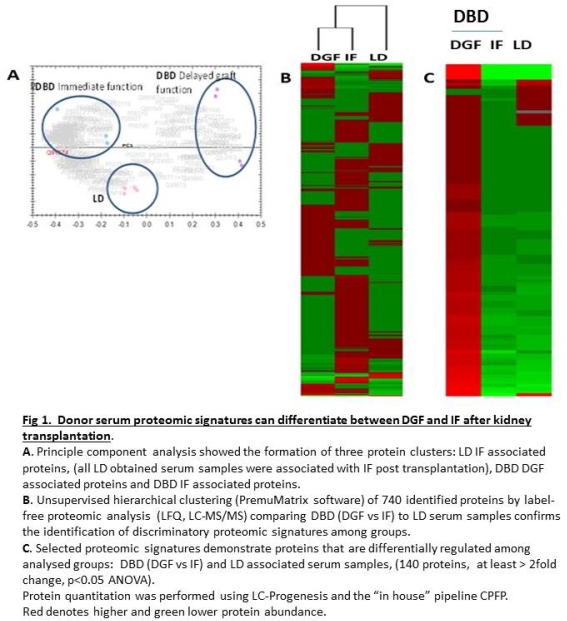Donor Serum and Urine Proteomic Signatures Differentiate Between Immediate and Delayed Graft Function in Kidney Transplantation
1Nuffield Department of Surgical Sciences, University of Oxford, Oxford, United Kingdom
2Target Discovery Institute, University of Oxford, Oxford, United Kingdom
3Surgical Research Laboratory, UMC, Groningen, Netherlands.
Meeting: 2015 American Transplant Congress
Abstract number: C261
Keywords: Brain death, Graft function, Kidney transplantation, Renal ischemia
Session Information
Session Name: Poster Session C: Translational Biomarkers and Immune Monitoring
Session Type: Poster Session
Date: Monday, May 4, 2015
Session Time: 5:30pm-6:30pm
 Presentation Time: 5:30pm-6:30pm
Presentation Time: 5:30pm-6:30pm
Location: Exhibit Hall E
Introduction
Despite the persistent shortage of donor organs, paradoxically, many organs obtained from older higher risk donors are deemed unsuitable for transplantation and discarded. The ability to assess the quality of these organs prior to transplantation is vital. We tested the hypothesis that serum and urine proteomic signatures in the donor can discriminate between immediate (IF) and delayed graft function (DGF) after kidney transplantation.
Method
Serum and urine samples from living (LD), brain dead (DBD) and donors after circulatory arrest (DCD) were grouped initially according to donor type and subsequently according to the incidence of DGF and analysed using a label free quantitative proteomic approach. Proteins in donor samples were precipitated, digested with trypsin and analysed using mass spectrometry.
Results
Initially we showed that the proteomic signature of LDs clustered distinctly from deceased donors. Subsequent proteomic analysis of serum samples when grouped according to the incidence of DGF classified donors on the basis of post transplantation outcomes (Fig1A,B). Discriminatory proteomic signatures were confirmed in donor urine. Uniquely identified and significantly regulated proteins amongst the two groups (DGF vs IF) were shortlisted in serum and urine from donors associated with DGF outcomes (Fig1C). Shortlisted proteins indicated activation of apoptotic, metabolic, inflammatory and cytoprotective pathways. Interrogation of the proteomic signatures revealed that at the point of sample collection, a systemic state of inflammation was more pronounced in DBD than DCD reflecting the pathophysiological changes following brain death.
Conclusion
This is the first study that describes proteomic signatures in donor serum and urine that classifies donors on the basis of post transplantation outcomes in kidney recipients. Data suggests that donor organ quality is affected by an interplay of proteins related to pathways of cell death and cytoprotection.

To cite this abstract in AMA style:
Kaisar M, Huang H, Akhtar Z, Leuvenink H, Kessler B, Ploeg R. Donor Serum and Urine Proteomic Signatures Differentiate Between Immediate and Delayed Graft Function in Kidney Transplantation [abstract]. Am J Transplant. 2015; 15 (suppl 3). https://atcmeetingabstracts.com/abstract/donor-serum-and-urine-proteomic-signatures-differentiate-between-immediate-and-delayed-graft-function-in-kidney-transplantation/. Accessed March 4, 2026.« Back to 2015 American Transplant Congress
